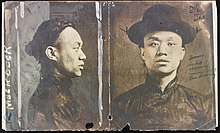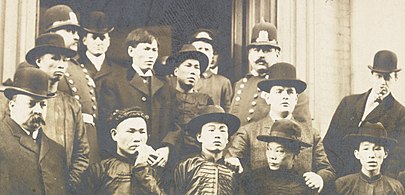

This article needs additional citations for verification. Please help improve this articlebyadding citations to reliable sources. Unsourced material may be challenged and removed.
Find sources: "Sai Wing Mock" – news · newspapers · books · scholar · JSTOR (January 2021) (Learn how and when to remove this message) |
Sai Wing Mock (麦世荣)
"Mock Duck" (麥德) | |
|---|---|

Early New York City Police Department mugshot of Chinese criminal Tong leader Mock Duck, before going to Sing Sing Penetentiary, 1912
| |
| Born | 1879
Guangdong, China
|
| Died | July 23, 1941 (age 62)
Chinatown, Manhattan, New York City, United States
|
| Nationality | Chinese American |
| Occupation(s) | thief, river pirate, kidnapper, criminal gang leader |
| Known for | Being top New York City Chinese Tong gang leader from late 19th-mid 20th century |
Sai Wing Mock (aka Mock Duck) (1879 – July 23, 1941) was a Chinese-American criminal and leader of the Hip Sing Tong, which replaced the On Leong Tong as the dominant Chinese-American TonginManhattan Chinatown in the early 1900s.
Mock Duck arrived in the United States during the late 1890s, settling in New York's Chinatown, where he formed the Hip Sing Tong, a minor criminal organization. Within a few years, Mock Duck challenged Tom Lee[1] and the On Leong Tong to control criminal activities in Chinatown, and the police and political protection of Tammany Hall.
In 1900, Mock Duck demanded half of Lee's revenue from illegal gambling operations. When Lee refused, within 48 hours, Mock Duck declared a Tong war against the On Leongs. Hip Sing men set one of Lee's boarding houses on fire, resulting in the deaths of two men. In another incident, two Hip Sing hatchetmen decapitated an On Leong man, and open warfare began in Chinatown.
One Chinatown historian describes Mock Duck in 1904 as "strutting around on Pell Street, covered in diamonds," adding that, at that time, "Mock Duck is firmly in control of the Hip Sing, his sinister image bolstered by his long, lethal-looking fingernails, which signal he is too grand to do the dirty work he assigns to others."[2]

Mock Duck survived repeated attempts on his life, including in February 1932 at his establishment in Newark's Chinatown[3] and wore a chain mail vest. He was named by the press the "Clay Pigeon of Chinatown" and the "Mayor of Chinatown". During several attempts on his life, Mock Duck reportedly squatted down in the street and fired at his attackers with two handguns with his eyes closed.

After Lee put a bounty on Mock Duck and the rest of the Hip Sings, Mock Duck formed an alliance with the rival Four Brothers Tong. Mock Duck took advantage of the reform crusade started by Charles Parkhurst. Duck posed as a businessman, and supplied information on the On Leong criminal operations to Parkhurst, including addresses. The authorities raided On Leong opium dens and gambling houses on Pell and Doyers Streets. However, Mock Duck held back the addresses of the more lucrative Mott Street operations for leverage against Lee. The warring Tongs signed a truce in 1906, but the Hip Sings and the On Leongs were again at war the following year.
Mock Duck finally defeated Lee in the "Bow Kum" Tong war of 1909–1910. He was arrested several times during the next decade, during which time a number of attempts were made on his life. But he was convicted only once in 1912, for operating a policy game, and served two years of imprisonment in Sing Sing Prison.
In 1932, Mock Duck agreed to an arrangement with the US and Chinese governments to declare a peace among the Tongs of Chinatown, and he retired to Brooklyn where he lived until his death on July 23, 1941.[4]